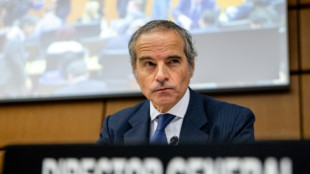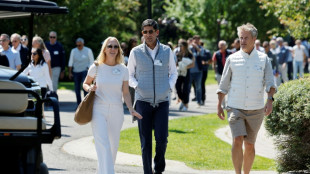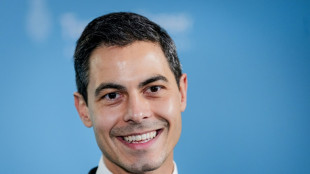
-
 Fela Kuti: first African to get Grammys Lifetime Achievement Award
Fela Kuti: first African to get Grammys Lifetime Achievement Award
-
'Schitt's Creek' star Catherine O'Hara dead at 71

-
 Curran hat-trick seals 11 run DLS win for England over Sri Lanka
Curran hat-trick seals 11 run DLS win for England over Sri Lanka
-
Cubans queue for fuel as Trump issues energy ultimatum

-
 France rescues over 6,000 UK-bound Channel migrants in 2025
France rescues over 6,000 UK-bound Channel migrants in 2025
-
Surprise appointment Riera named Frankfurt coach

-
 Maersk to take over Panama Canal port operations from HK firm
Maersk to take over Panama Canal port operations from HK firm
-
US arrests prominent journalist after Minneapolis protest coverage

-
 Analysts say Kevin Warsh a safe choice for US Fed chair
Analysts say Kevin Warsh a safe choice for US Fed chair
-
Trump predicts Iran will seek deal to avoid US strikes

-
 US oil giants say it's early days on potential Venezuela boom
US oil giants say it's early days on potential Venezuela boom
-
Fela Kuti to be first African to get Grammys Lifetime Achievement Award

-
 Trump says Iran wants deal, US 'armada' larger than in Venezuela raid
Trump says Iran wants deal, US 'armada' larger than in Venezuela raid
-
US Justice Dept releases new batch of documents, images, videos from Epstein files

-
 Four memorable showdowns between Alcaraz and Djokovic
Four memorable showdowns between Alcaraz and Djokovic
-
Russian figure skating prodigy Valieva set for comeback -- but not at Olympics

-
 Barcelona midfielder Lopez agrees contract extension
Barcelona midfielder Lopez agrees contract extension
-
Djokovic says 'keep writing me off' after beating Sinner in late-nighter

-
 US Justice Dept releasing new batch of Epstein files
US Justice Dept releasing new batch of Epstein files
-
South Africa and Israel expel envoys in deepening feud

-
 French eyewear maker in spotlight after presidential showing
French eyewear maker in spotlight after presidential showing
-
Olympic dream 'not over', Vonn says after crash

-
 Brazil's Lula discharged after cataract surgery
Brazil's Lula discharged after cataract surgery
-
US Senate races to limit shutdown fallout as Trump-backed deal stalls

-
 'He probably would've survived': Iran targeting hospitals in crackdown
'He probably would've survived': Iran targeting hospitals in crackdown
-
Djokovic stuns Sinner to set up Australian Open final with Alcaraz

-
 Mateta omitted from Palace squad to face Forest
Mateta omitted from Palace squad to face Forest
-
Djokovic 'pushed to the limit' in stunning late-night Sinner upset

-
 Tunisia's famed blue-and-white village threatened after record rains
Tunisia's famed blue-and-white village threatened after record rains
-
Top EU official voices 'shock' at Minneapolis violence

-
 Kremlin says agreed to halt strikes on Kyiv until Sunday
Kremlin says agreed to halt strikes on Kyiv until Sunday
-
Carrick calls for calm after flying start to Man Utd reign

-
 Djokovic to meet Alcaraz in Melbourne final after five-set marathon
Djokovic to meet Alcaraz in Melbourne final after five-set marathon
-
Italian officials to testify in trial over deadly migrant shipwreck

-
 Iran says defence capabilities 'never' up for negotiation
Iran says defence capabilities 'never' up for negotiation
-
UN appeals for more support for flood-hit Mozambicans

-
 Lijnders urges Man City to pile pressure on Arsenal in title race
Lijnders urges Man City to pile pressure on Arsenal in title race
-
Fulham sign Man City winger Oscar Bobb

-
 Strasbourg's Argentine striker Panichelli sets sights on PSG, World Cup
Strasbourg's Argentine striker Panichelli sets sights on PSG, World Cup
-
Jesus 'made love': Colombian president irks Christians with steamy claim

-
 IAEA board meets over Ukraine nuclear safety concerns
IAEA board meets over Ukraine nuclear safety concerns
-
Eurozone growth beats 2025 forecasts despite Trump woes

-
 Dutch PM-elect Jetten says not yet time to talk to Putin
Dutch PM-elect Jetten says not yet time to talk to Putin
-
Social media fuels surge in UK men seeking testosterone jabs

-
 Forest face Fenerbahce, Celtic draw Stuttgart in Europa League play-offs
Forest face Fenerbahce, Celtic draw Stuttgart in Europa League play-offs
-
US speed queen Vonn crashes at Crans-Montana, one week before Olympics

-
 Trump nominates former US Fed official as next central bank chief
Trump nominates former US Fed official as next central bank chief
-
New Dutch government pledges ongoing Ukraine support

-
 Newcastle still coping with fallout from Isak exit, says Howe
Newcastle still coping with fallout from Isak exit, says Howe
-
Chad, France eye economic cooperation as they reset strained ties


Kuwait's scorching summers a warning for heating planet
As the blazing summer sun beats down on Kuwait, shoppers stroll down a promenade lined with palm trees and European-style boutiques, all without breaking a sweat.
In one of the world's hottest desert countries, it's all made possible by architecture and technology: the entire street is located inside the heavily air-conditioned Kuwait City shopping mall.
Outside, where temperatures now often soar around 50 degrees Celsius (120 degrees Fahrenheit), barely anyone is moving around on foot, leaving the historic market largely deserted.
"Only a few people stay in Kuwait at this time of year," said date merchant Abdullah Ashkanani, 53, as large fans sprayed cooling mist onto the few customers braving the blistering heat.
Ashkanani, who hails from Iran, said he keeps his shop open largely "for appearances" during the hottest months when most of Kuwait's four million residents flee abroad.
For those who stay behind in the tiny oil-rich country, life is made bearable by the ever-present Arctic blast of air-con systems.
"We can put up with it because the house, the car, everything is air-conditioned," said pensioner Abou Mohammad, dressed in a white robe and keffiyeh and sitting in a comfortably cooled cafe.
The irony is not lost on him that such energy-guzzling systems produce the carbon emissions that are heating up the planet -- especially the sweltering Gulf region, a climate hotspot.
Such excessive energy consumption, said Mohammad, has "brought this heat to Kuwait".
- Heating up -
Kuwait is home to seven percent of the world's crude reserves -- energy wealth that has long afforded many of its people a luxury lifestyle.
An extremely water-scarce country, it also relies heavily on fossil fuels to power seawater desalination plants.
Like Saudi Arabia and Qatar, Kuwait is one of the world's leading emitters per capita of CO2, a key driver of global warming.
Kuwait has always been hot, its dry summers fanned by the northwesterly shamal wind that also blows over Iraq and Saudi Arabia.
Temperatures in Mitribah, a remote area in northwest Kuwait, often soar past 50 degrees Celsius, making it one of the hottest places on Earth after Death Valley in eastern California.
But in recent years, climate change has made summer peaks hotter and longer, said meteorologist Essa Ramadan, as periods of extreme heat have gone "from two weeks to about a month".
The number of days per year that see temperatures rise above 50C have more than tripled since the turn of the century, noted the meteorologist.
As the world records ever more heat records, "what is happening to us will happen elsewhere", he warned.
- Grassroots -
Kuwait -- where glass towers soar into the sky and cars choke the highways -- has only recently invested in public transport and green energy to help counter climate change.
Its environment protection authority, which falls under the oil ministry, recognises "a rise in temperatures in recent years", its director Samira Al-Kandari said.
To help change course, Kuwait has started building its first commercial solar power park, the Shagaya project.
With the first phase complete, and other projects planned, Kandari said Kuwait's goal is that "renewable energy constitutes 15 percent of our energy production by 2035".
"We will increase this percentage in the future," she said.
Outside of the state institutions, some Kuwaiti citizens have launched grassroot initiatives, including tree-planting to help cool sun-baked urban environments.
Essa Al-Essa, a 46-year-old dentist, started planting trees as a "hobby" in a vacant, sandy lot near his home on the outskirts of the capital, he told AFP.
In 2020, at the height of the Covid pandemic, he developed it into the Kuwait Forest project, starting a green space that also helps scrub the air and captures carbon.
"Trees are particularly useful in polluted places such as industrial and residential areas," said Essa.
But he also hopes the natural shade and cooling they provide will help break the dominance of energy-intensive air-conditioning.
"The more we cool our houses," Essa said, "the more we warm our surroundings."
C.Meier--BTB




